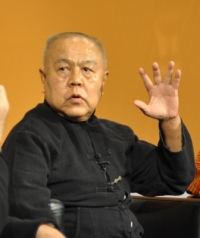Übersicht Referenten und Diskutanten
Sulak Sivaraksa
Sulak Sivaraksa ist Professor für Soziologie. Unter aderem unterrichtete er an der University of California (Berkeley), der Cornell University (Ithaca) und der University of Toronto. Nach seinem Studium in England und Wales kehrte er 1961 in seine Heimat nach Siam (ehemalige Name Thailands) zurück. Dort gründete er 1968 die Stiftung Sathirakoses-Nagapradeepa, die sich für soziale Gerechtigkeit und Umweltschutz einsetzt. Sulak Sivaraksa ist in zahlreichen weiteren Stiftungen und Nichtregierungsorganisationen auf der ganzen Welt aktiv. Unter anderem ist er Mitgründer vom "Asian Cultural Forum on Development", vom "International Network of Engaged Buddhists" sowie des Projekts "Alternatives to Consumerism". 1995 wurde er mit dem Right Livelihood Award, dem Alternativen Nobelpreis ausgezeichnet.
Statement zum Diskussionsthema
Western societies depend too much on the Cartesian concept of cogito ergo sum, concentrating too much on thinking, on egoism and individualism. Dualism is inevitable. Always black and white, good and evil. So much competition with and conquest of others, not only other gender, races, classes and nations - but also all other sentient beings, including nature.
Buddhism can help everyone to breath properly. Breathing is the most important element in our life. If we learn to breath in and out mindfully, we can transform hatred, greed and delusion to compassion, generosity, and real understanding or wisdom. We will realize that we are interconnected - without you there cannot be me. You and I inter-are, connected as friends, not enemy. Without trees, we cannot exist. We should learn from trees, for instance, not regarding trees merely as natural resources for our economic gain.
We should also understand that social structure is unjust and violent. How could we change social structure nonviolently and truthfully?
With seeds of peace inside each of us, we can really build a peaceful world. Peace is the means as well as the goal.
Ausgewählte Veröffentlichungen
Conflict, Culture, Change. Engaged Buddhism in a Globalizing World (2005)
Saat des Friedens: Vision einer buddhistischen Gesellschaftsordnung. Aurum-Verlag, Braunschweig (1995)
Ausgewählte Zitate
"Consumerism is able to dominate much of contemporary society because individuals have become alienated from their culture and from each other. The sense of community that led people to share scarce resources and work cooperatively has been supplanted by the vile maxims of the masters of mankind, by an anger and competitiveness that causes people to seek acquisitions at the expense of their neighbors. In sum, consumerism is a consequence of using greed and violence to regulate socioeconomic relations."
In: Alternatives to consumerism - a Buddhist programme, www.sulak-sivaraksa.org
"In Buddhism, prosperity is defined as "more being." As such, it cannot be realized atomistically, only collectively and with an emphasis on spirituality. Buddhism denounces and renounces greed, because it is seen as leading one down the perfidious road of aggression and hatred - in a word, of suffering. Greed can never lead to satisfaction, individually or collectively. Thus Buddhism seeks to show how to be content with changing oneself - that is, self-cultivation - and emphasizes the importance of caring about, promoting, and benefiting from one another's wellbeing."
In: Alternatives to consumerism - a Buddhist programme, www.sulak-sivaraksa.org
"One of the key and unique teachings by the Buddha is the interrelatedness among all beings. The teachings of the Buddha, in addition to the great extent on renunciation, include numerous guidelines of how individuals should live together in a peaceful and beneficial manner."
In: Buddhist Values for the Righteous Politics, www.sulak-sivaraksa.org




